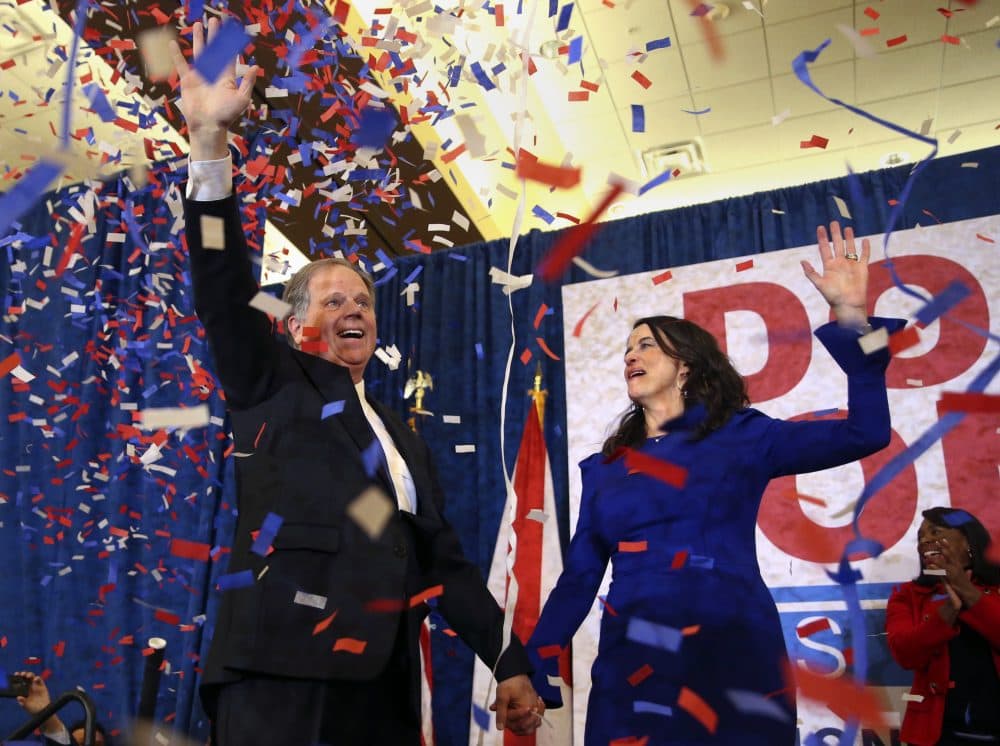Advertisement
Doug Jones And The "Crackup Of The Trump Voter Coalition"
Resume
This week on Freak Out And Carry On, Ron Suskind and Heather Cox Richardson talk with Carol Anderson, professor of African American Studies at Emory University and author of "White Rage", and Jack Hitt, host of the podcast "Uncivil" and long-time This American Life contributor. They react to Doug Jones's victory in the Alabama Senate race and what it means for the Republican party and President Trump.
Excerpts
Carol Anderson: I've got to tell you, initially, it was just relief because thinking about having someone like Roy Moore in the Senate was just unconscionable. And then there was just incredible pride. Pride because of the mobilization of civil society in Alabama. Pride because you had the majority of Alabamans who voted say we want no piece of this. I see this as a moment where the nation is coming to reckon with itself, between what it is in its most depraved, debased way and its aspirational self, who it really wants to be. And that was what was so stark and clear.
Jack Hitt: We should have called it almost the miracle of Alabama because the chances of Doug Jones pulling this off were so remote and about 100 pieces had to all fall precisely in place for him to win. We can analyze it and granular detail, but the other thing that I love about an election like this is that as as President Donald Trump said, in a tweet, "A win is a win." And that's how most Americans will see it. Most Americans just saw a Republican lose in Alabama and that is a huge, huge story. And Donald Trump, who doesn't like to be branded a loser, now has to embrace that. Although I'm sure in his tweets he will find a way to back out of having been a loser on this one. Every election is an up or down vote. Somebody wins and somebody loses. And the Democrat won in the state of Alabama.
I think we're watching the crackup of the the Trump voter coalition, because I think part of it is that they can't quite identify which period in American history was when America was great. I think Trump ran on sort of like this halcyon 1950s, Eisenhower era idea. Obviously Roy Moore thought it was 1850, in the end, the high watermark of American human bondage. The Heritage Foundation thinks it's like the 1920s or something when we had this like super laissez-faire game. But no one can quite identify the right sort of moment when America was so super great because each one, once you analyze it you know that if you were anything but a white upper-class man you know well it wasn't great.
Carol Anderson: One of the things that we need to be paying attention to is what that black voter turnout was about. Yes, you had incredible grassroots mobilization and organization. But when you talk to African-Americans, they recognize it--as black women did during the 2016 election--that the Trump wing of politics in America is absolutely lethal for black people. And I'm also heartened by it because you know Alabama has a really tough voter suppression, between the voter ID requirement and then closing down the Department of Motor Vehicles in the Black Belt counties, to purging the voter rolls and then putting people on the inactive list. But because the stakes are so high now what the Democratic party needs to be paying attention to is that African-Americans, particularly black women, have been the core of the party. And if that constituency is not paid attention to, if there is a way to shield the black community from some of the lethalness that's out there, the last thing that the Democrats need to do is to ignore that constituency. And so I saw where Tom Perez, who is the chair of the DNC, acknowledged the role of of African-Americans and particularly black women and said that this is the constituency we cannot ignore. Now the fact that you have to say that out loud in 2017 tells you that that is a constituency that has been ignored.
Jack Hitt: Well, it harkens back to the time when we really had four or five parties under the guise of two. Right? When we had like the Nelson Rockefeller wing of the Republican Party and also the very conservative wing. And then we had conservative Democrats in the South and liberal Democrats elsewhere. Right. And the nice thing about that was that if you could get three of those voter blocs to maneuver together then you had legislation passed. So this hardened duality that we've been living under for the last couple of decades really makes governance almost impossible. So I hope you're right that were cracking that up and that we will have these different factions. I just want to go back to one thing about Doug Jones for a second. He has to go to Washington now and start voting on some very precarious things, like maybe even this tax bill. The voters who sent him there, I'm pretty sure, would not be in support of this bill. But he's going to now have to maneuver as sort of a semi-conservative Democrat from Alabama and he's going to have to play inside the congressional arena.
The views and opinions expressed in this podcast are solely those of the participants and do not in any way reflect the views of WBUR management or its employees.
